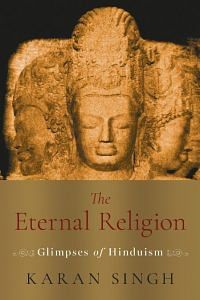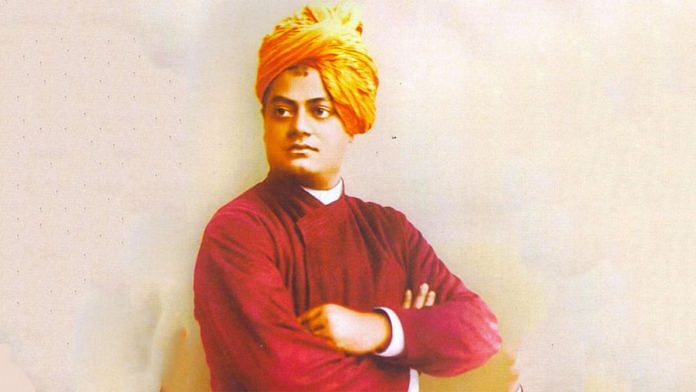At a time like this, I think the message of Swami Vivekananda can be extremely valuable, extremely useful, to us. And, therefore, I will try and place before you, as I see them, some of the salient features of Swamiji’s teachings.
Swamiji once wrote that his ideal can be put into a few words. And that is to preach unto mankind their divinity and how to make it manifest in every moment of life. This was his basic message. There are many facets of his teachings. I think the first is the Unity of all Religions. Not merely tolerance of religions—I would like to make this point, because tolerance is essentially a negative attitude. Tolerance merely means the absence of opposition. That is not what he preached. His was a positive acceptance of the unity of all religions. He was preaching the old Rig Vedic dictum:
Ekam Sat Vipraha Bahudha Vadanti
(Truth is one, the wise call it by many names.)
Or the Mundaka Upanishad:
Yathan Nadyah Syandamaanaah Samudre Astam gacchanti Naamaroope Vihaaya
Tathaa Vidwaan Namaroopaad Vimuktah Paraat Param Purushamupaiti Divyam
(As streams arising from different parts of the country find their way ultimately to the same ocean, so do the various religions that have arisen here and throughout the world lead ultimately to the same spiritual goal.)
Also read: ‘I can’t have Gujarat? I’ll get Hindustan’- Bahadur Shah after fleeing murder maze in Delhi
This was something that Swamiji taught, not merely as an intellectual exercise, but, born out of deep conviction and deep realization, because you will recall that Sri Ramakrishna in the course of his unique sadhana had actually experienced the unity of various religions. He had lived for several days as a Muslim and had had a vision of a divine personage who, he thought, was the Prophet of Islam.
He had lived as a Christian and had a vision of the Christ of Christianity. And so, the unity of religions preached by Sri Ramakrishna and Swami Vivekananda was not merely something that is politically advantageous just because we happen to have a lot of non-Hindus in this country (that is the way in which many people preach secularism today). That was not their secularism.
It was in a glowing and dynamic unity of religions. And I think that this is something, which today we must once again realise. All too often, we take what we call a secular stance because we feel that it is politically necessary to do so because India is inhabited, apart from the Hindus, by many crores of Muslims, Christians, Buddhists, Sikhs, Jains, Parsis, and so on. I do not think that is the correct attitude. There may be a narrow political advantage, but the real attitude is to accept the unity of the goal of all religions and this is to my mind one of the most important teachings of Swami Vivekananda.
Also read: Nehru & Savarkar shared one thing – the use of sacred geography to build national identity
The second aspect is the divinity of man. Now the Divinity of god is not a very novel concept, because, after all, if there is a god, he is bound to be divine. There is nothing very special about it. But what do the Vedas and the Upanishads preach us? They preach the divinity of man. The Upanishads have a wonderful term for the human race: Amruthasya Puthra (Children of Immortality).
What an extraordinarily bold and powerful concept this is! That every human being born on this planet, whether he is rich or poor, whether he is a Hindu or a Muslim or belongs to any other faith, whether he is born in India or in the Antarctic or any other part of the world, he is a ‘Child of Immortality!’ immortality is his birthright. This is something which Swamiji always used to stress. And he always used to say that it is not merely the rich, or people belonging to a community or caste that must be considered divine, but it is the entire mankind. And this concept of the divinity of man, therefore, cuts across all creeds, cuts across all nationalities, and embraces within its ambit the entire human race.

Extracted from The Eternal Religion: Glimpses of Hinduism by Karan Singh. Published by Speaking Tiger Books, 2023.



